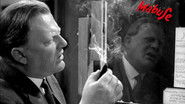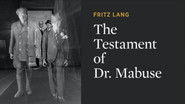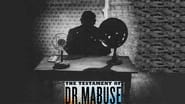disinterested_spectator
Sometimes a book or a movie gets more praise than it deserves because it was banned somewhere. And what could be better for a movie than to have been banned by Joseph Goebbels himself, the Minister of Propaganda in Nazi Germany! Other than that, there is no explanation for why anyone thinks this movie is any good.If "Dr. Mabuse: The Gambler" (1922) was over the top, "The Testament of Dr. Mabuse" is absurd. The title character went insane in the first movie and was confined to an insane asylum. Then, Hofmeister, a criminal who once was a police detective, but was cashiered for bribery, goes mad out of fear of Dr. Mabuse. By the end of the movie, Dr. Baum, who runs the asylum, goes mad as well and has to be confined. But it does not stop there. The plot is so outrageous as to make one think the movie itself was produced by a madman.For starters, while Dr. Mabuse is in the insane asylum, he still manages to run a criminal organization, planning crimes down to the last detail. His motives are as mad as he is. Whereas in the first movie, he simply wanted power and the pleasure of manipulating the lives of others, in this movie he wants to drive the whole world mad by getting people hooked on drugs, which he supplies for free, and by causing so much terror and destruction that civilization will collapse, leaving nothing behind but crime as a way of life.Mabuse communicates with his henchmen by willing his thoughts onto a record, which plays when he so wills it, while a cardboard image of himself sits behind a curtain, casting a shadow. Do you dare ask how this curtain, cardboard image, and record player came to be set up in this room where criminals go to get their orders when commanded to do so by a piece paper with a typewritten message on it? Why, Mabuse just wills it all into place!Things get a little easier for Mabuse when he dies and wills his spirit into Dr. Baum, so now he has another body to occupy that can leave the asylum. But he loves the record gimmick so much that when Dr. Baum wants his servant to think he is in his quarters, the record player is turned on whenever someone wiggles the door handle, causing it to play the message, "I do not wish to be disturbed."Kent, a man who killed his girlfriend and her lover and went to prison for it, is forced by economic circumstances into Mabuse's criminal organization. Together with Lilli, the woman he loves, he decides to go straight. But before he can make it to the police station, he and Lilli are captured and brought to the room with the curtain, the cardboard image, and the record player. After the door is locked behind them, the record tells them they will never leave the room alive. Eventually, Kent and Lilli pull back the curtain and discover the setup. Then they hear ticking, the sound of a time bomb. What better way to have a couple of people killed than to blow up your own headquarters! But when you can will yourself into another body, will your thoughts onto a record, will your thoughts through a typewriter onto a piece of paper, and will an entire setup consisting of record player, curtain, and cardboard image, and finally will a time bomb into existence as well, then I suppose it is child's play to will the whole setup into existence somewhere else after you destroy it with that time bomb just to kill two people.But all is not lost. We can tell ourselves that this movie was an attempt by Fritz Lang to warn us of the danger of Adolf Hitler and that will make the movie profound somehow.
Coventry
I'm sadly not an expert on director Fritz Lang's life and wondrous film repertoire, but I read somewhere that the original 1922 "Dr. Mabuse, der Spieler" was like a metaphor for everything that went wrong in contemporary Germany, what with its decadence and corruption. Eleven years later, the Nazi party had risen to power, and the notorious (and nefarious) Joseph Goebbels single-handedly decided that the follow- up "The Testament of Dr. Mabuse" should be banned from the public. Ironically enough, the same Joseph Goebbels almost simultaneously offered Fritz Lang to become manager of the German Film Institute. According to the legends, Lang suspected that it was some kind of ambush and fled the country overnight. I don't know if the whole story is true, but it's definitely fascinating! The film itself is truly a must-see for cinema fanatics and historians, although I have to admit it is a very complex and demanding movie to watch. It's a genuine crime thriller, albeit with unmistakable horror aspects. Vile crimes are being committed all over the city and all traces lead back towards the infamous Dr. Mabuse. One minor little problem, however, Dr. Mabuse resides in a hermetically sealed off cell in a mental institution. But like his obsessive fan Dr. Baum proclaims in all his lectures, Mabuse is a true genius that even masters the art of hypnosis. Could it be that he is mind-controlling his minions all of town in order to commit his crimes? Commissioner Lohmann, the same cop who chased presumed child murderer Peter Lorre two years earlier in "M", is in charge of the investigation. Certain sequences in "The Testament of Dr. Mabuse" are incredibly tense and petrifying, like for example when the sinister doctor appears and disappears like a ghost. Other scenes, particularly the crime sequences, are very intelligent and utmost ingenious! For example, I'll probably never forget the scene where the targeted victim of a murder is driving his car and stopping at the red light. His killer, in one of the cars next to him, evokes a series of honking among all the cars in front of the red light and even the targeted victim joyously joins the honking concert. Then, with all the noise of the honking, the killer can inconspicuously pull the trigger of his shotgun and nobody noticed the loud blast. Only when the light switches back to green and all the other cars are long gone, a policeman discovers the lifeless body behind the wheel. Rudolf Klein-Rogge doesn't have a whole lot to do, in fact, but performance as the titular Dr. Mabuse still stands as one of the most legendary villainous characters of all time. The film is a technical and visual masterpiece that still also carries a lot of trademarks and atmospheric characteristics of the silent era with it. Truly unique cinematic heritage
melvelvit-1
Could Dr. Mabuse, long confined to an asylum for the criminally insane, also be the mysterious mastermind whose gang is terrorizing the city? Inspector Lohmann is determined to find out in a visually startling, Expressionistic thriller that unspools like a cliffhanging serial. Director Fritz Lang's uniquely Teutonic vision blends Gothic horror with tabloid crime and the megalomaniacal Dr. Mabuse is another kind of genius ...as in the anti-Christ. His plans for the human race include global chaos via an "empire of crime" -in other words, evil for evil's sake, an anarchistic philosophy worthy of the Marquis De Sade. It's also a death wish in mankind's collective subconscious and a potent prism that can be played for laughs as in John Waters' FEMALE TROUBLE where "crime is beauty" or as an all-too-real phenomenon like Charles Manson's "Helter Skelter". The film was banned in Nazi Germany (what were they afraid of?) and has the kind of diabolical villainy that never goes out of style. It's also a (not too) distant relative of the German krimi and possibly James Bond. Highly recommended.
pwoodstock23
The Testament of Dr. Mabuse is a fascinating film, filled with neat moments and some great, hallucinatory camera-work.Lang really knows what he is doing with the camera shots, as the film is filled with great amounts of really memorable imagery, such as the car shooting, where all the traffic moves except for one car. Another great moment is the ghost of Dr. Mabuse (with some truly freaky eyes) haunting the halls of the mental institution.While the movie has great imagery, it feels like there should have been more of it. Large parts of the movie are given over to inspector Lohmann (hope I'm spelling that right) as he gradually tracks down the person behind the crime syndicate. Mabuse gets little screen time, as it should be, but he feels largely forgotten as the police go down plot tangents.But still, the film is based around such a good central concept (A hypnotist controlling behaviour from behind prison walls, and writing instructions for others to follow), and the Nazi parallels so interesting that it is definitely not a bad movie at all. See it.Also: Creepiest movie poster ever. Google it.









